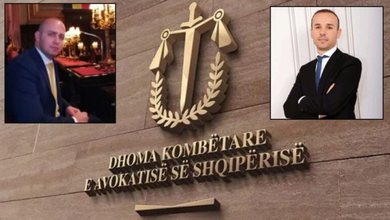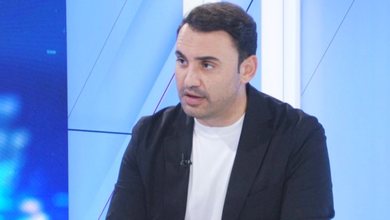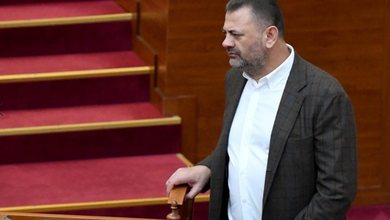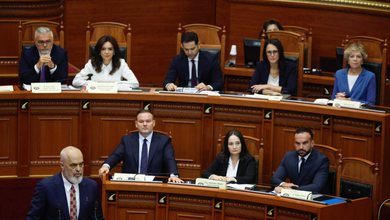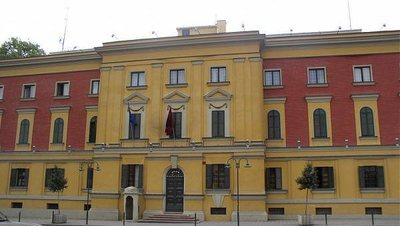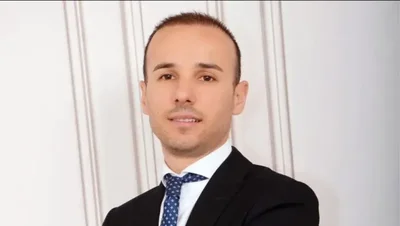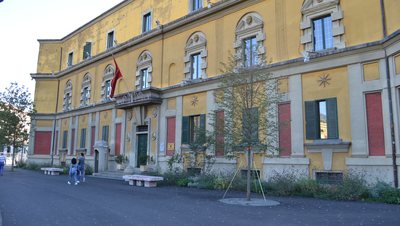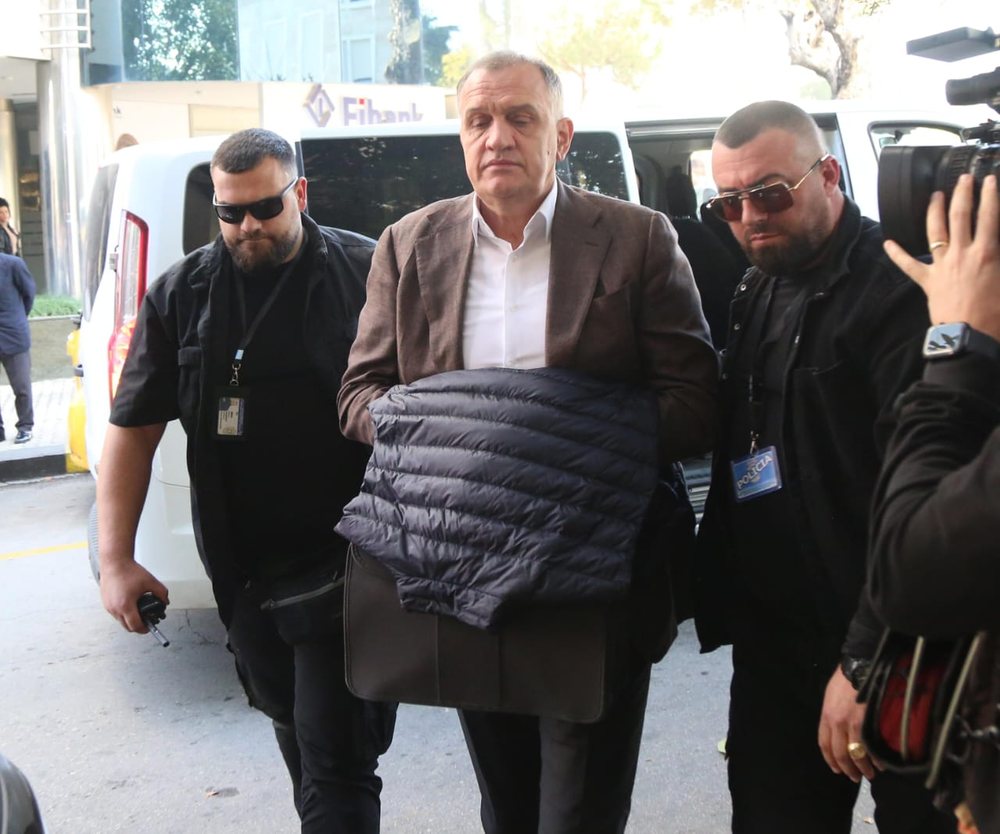
Former Minister of Health Ilir Beqaj, who is being held in Durrës detention center, writes an open letter to the Parliament alleging violations of his rights during the investigation, trial, and solitary confinement.
From the Durrës detention center, former Minister of Health Ilir Beqaj states that his rights have been violated during the investigation, the trial, and his solitary confinement. Through his lawyer, Beqaj is concerned about the functioning of justice institutions and the passive role of the Parliament.
Beqaj accuses the Assembly of failing for two consecutive years to effectively oversee independent institutions such as the Supreme Court of Kosovo, the Constitutional Court, the Special Prosecution Office, etc. According to him, the lack of concrete questions and demands for accountability has allowed illegal practices to become the rule.
Full letter:
In my capacity as the legal counsel for Mr. Ilir Beqaj and at his request, I am making the following publication:
Open letter
The Assembly that (doesn't) ask what and how it should be asked?
(Why did the annual reports of "independent" justice institutions fail in the Albanian Parliament)
Honorable ladies and gentlemen,
I have been on a restricted regime for months. This has given me more free time than usual and the television has become my only window to the free world. For the second year in a row, I have been following with attention the live broadcasts of the annual reports to the Albanian Parliament of the independent institutions of justice.
When I was in that hall myself, I did not pay any particular interest to these reports. I was more attracted to those of ERRE, AKEP, ERRU, the Bank of Albania or the Financial Supervisory Authority. But today, with distance and concrete experience with the justice system, it has become clear to me that the Albanian Parliament has failed for two consecutive years with the reports of independent institutions such as the KLGJ, KLP, ILD, etc.
The leaders of these institutions avoided answering specific questions because they are independent. And, in a way, they are right. Even more so when those who voted for their independence cannot be the ones who violate them.
There are also MPs who hide behind the same excuse: "they are independent institutions, they should not be harassed."
But independence does not mean lack of accountability. If the law has granted them this independence, the Assembly has a legal and moral obligation to verify how that independence is being exercised.
I am not a lawyer, but my experience in public life and my encounters with justice in recent years have helped me compile a non-exhaustive, but essential, list of questions that the Assembly failed to ask.
I. General and institutional questions
1. How is it possible that the issue of wiretapping of members of the Constitutional Court was not addressed at all? Was it investigated who ordered it, how it was carried out, and were the legal guarantees respected? The independence of constitutional judges does not only protect a few individuals, but also protects the balance of the entire system.
2. How is it possible that the Appeals Court of Kosovo does not implement the decisions of the Constitutional Court? When the Constitution states that its decisions are “binding for immediate implementation,” who is responsible for their non-implementation?
3. How is it possible that the Supreme Court of Kosovo has not appointed a single court president for six years, but all of them have temporary leaders? Permanent leadership is a contradiction. Without a permanent leader, there is neither vision nor accountability.
4. How is it possible that different criminal panels of the Supreme Court issue opposing decisions on the same legal issue and the Court does not rush to issue a unifying decision? When practice is divided, justice becomes a lottery.
5. How is it possible that after six years of operation, the Special Prosecution Office has still not clearly understood who is a “senior official” according to the Constitution and the Code of Criminal Procedure? How many decisions of the Special Court have been overturned precisely because charges were filed against persons who did not fall into the category of senior officials? Regardless of material competence, personal competence cannot be invented for statistical reporting.
6. How is it possible that the financial threshold to qualify a criminal offense as “with serious consequences” is still based on a 2003 Supreme Court decision? In a country where prices, costs and salaries have increased several times, justice continues to judge with the “value of money” of 22 years ago. How much has the annual salary of the prosecutors themselves who still apply that threshold increased in the meantime? If the law does not move with the times, justice remains in the museum.
7. According to Article 222 of the Code of Criminal Procedure, wiretapping is permitted by court decision for a period of 15 days and can only be extended by another decision, equally reasoned. But when after several 15 consecutive days the wiretapping does not reveal anything suspicious, why does the court approve the prosecution's blind insistence on continuing it? The law requires “special justification”, not “routine approval”. Otherwise, judicial review loses its meaning and the exception becomes the norm.
8. Why has the exception of Article 223/3 of the Code of Criminal Procedure (postponement of filing of wiretapping proceedings) been transformed into a general rule? In every first request, it is requested that the minutes not be filed for five days, but “until the end of the investigations”. The exception is no longer an exception, but has become a stable practice, removing any real control by the court.
9. How is it possible that the 15-day deadline set in Article 110 of the Code of Criminal Procedure to express a decision on the defense requests is openly violated by the prosecution offices, without any consequences? When the very body that requires the rigorous implementation of the law violates it with procedural silence, any guarantee becomes formal. The law is not “orienting”. It is an obligation.
10. How is it possible that the fee for a photocopy page at the Special Prosecutor's Office is 6.6 lekë for the citizen, while only 2.2 lekë for the court? In a justice system that preaches equality before the law, how is it justified that the state itself pays three times less than the party defending itself? The fee by definition must cover the costs. It matters little who requests the service.
II. Technical and procedural questions
11. How is it possible that prosecutors bypass the mandatory jurisprudence on digital evidence? I am mentioning some of them: Unified Decision of the Supreme Court no. 147, dated 23.12.2021, “Lapsi.al
”; Constitutional Court Decision No. 21, dated 24.04.2025, “EQ”; Constitutional Court Decision, July 2025, “OY”. These are not opinions, but binding standards.
12. How is it possible that prosecutors request personal data from mobile phone companies without a court order, in violation of Articles 208/a and 209 of the Code of Criminal Procedure? Privacy cannot be violated with a “letter of request”.
13. How is it possible that data on postal correspondence is requested without a court decision, in violation of Article 209 of the Criminal Procedure Code? The post office is not an open box for every diligent prosecutor.
14. How is it possible that prosecutors request data on electronic correspondence from the National Anti-Corruption Commission without a court decision (Articles 208/a and 209 of the Criminal Procedure Code)? The state cannot ask a state institution to violate the same law that it must enforce.
15. How is it possible that requests for the seizure of items are formulated in a general way: "electronic devices such as computers, laptops, hard drives, USBs, servers, telephones, regardless of who they belong to", and the courts approve them without any restrictions? These are "cartabianca" that contradict Article 207 of the Code of Criminal Procedure, which requires a specific definition of items that can be seized.
16. When will prosecutors and courts stop openly violating the Budapest Convention, ratified by Law No. 8888/2002? The standards exist, there is simply a lack of will to implement them.
17. When will forensic laboratories be equipped with the ISO standards required by the Council of Europe and ECHR guidelines on electronic evidence? At least ISO/IEC 27037 and ISO/IEC 27042 are a prerequisite for any credible digital investigation.
18. When will labs stop using unacceptable hash algorithms like SHA-1 or MD5? A simple Google search is enough to learn that they are vulnerable. The integrity of digital evidence cannot be protected with 2000s technology. At a minimum, SHA-256/SHA-3, with a full chain of custody, is standardized.
19. When will our forensic laboratories be accredited? Without accreditation according to ISO/IEC 17025, every expert report remains questionable and the judiciary cannot be certain about the evidence it uses.
This list, of course, is not complete. But even that is enough to show that the Assembly cannot be satisfied with formal hearings. It must summon not only the Supreme Court of Justice, the Supreme Court of Justice and the Supreme Court of Justice, but also the Chamber of Advocates as interested parties. It must demand concrete answers, deadlines and corrective measures and then demand accountability in the next report.
I know that after this note they will tell me:
"Mind your own business and don't give us any trouble."
"You're saying it now, because you have your own worries."
"You were there yourself when the reform laws were passed, you don't have to complain now."
They may be right in part. But it doesn't matter who says these things. What matters is whether they are true, and anyone can face tomorrow a system that they think is "far-fetched" today.
The Assembly has two choices: to cover itself with speeches, or to reveal itself with questions.
I, from this limited regime, have chosen the questions.
YOU???
With respect,
Ilir Beqaj


